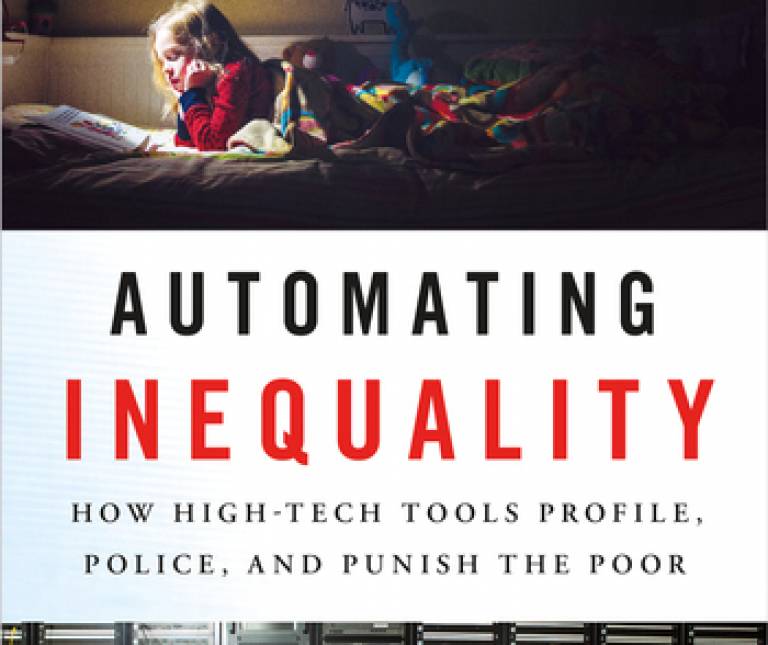STS 1Book 2019-20 - Virginia Eubanks: Automating Inequality
10 July 2019
Lauded by writers such as Naomi Klein and Cathy O'Neill, 'Automating Inequality' by Virginia Eubanks is the STS 1Book for 2019-20.

About the 1Book Programme
The STS 1Book programme has run since 2006, with the department choosing one book each year to be read by all staff and students, providing them with a common basis for discussion and learning in the following year. Recent years have featured writers such as Angela Saini, Philip Ball, Naomi Oreskes and Mark Henderson, and in 2019-20, Virginia Eubanks with be the author of choice.
The Book:
In Automating Inequality, Virginia systematically investigates the impacts of data mining, policy algorithms, and predictive risk models on poor and working-class people in America. The book is full of heart-wrenching and eye-opening stories, from a woman in Indiana whose benefits are literally cut off as she lays dying to a family in Pennsylvania in daily fear of losing their daughter because they fit a certain statistical profile. Deeply researched and passionately written, Automating Inequality could not be more timely. The book won the McGannon Center Book Prize for 2018, and has received glowing reviews in the New York Times and Financial Times, and by writers such as Cathy O'Neill, Cory Doctorow and Dorothy Roberts.
"Required reading for the modern age, Automating Inequality explains through beautifully rendered individual stories and deeply researched historical analysis why we must remain vigilant and skeptical of the promises of artificial intelligence fed to us by those who stand to gain from their adoption." Cathy O'Neil, New York Times bestselling author of Weapons of Math Destruction
"[Automating Inequality's] argument is that the use of automated decision-making in social service programs creates a "digital poorhouse" that perpetuates the kinds of negative moral judgments that have always been attached to poverty in America...Eubanks proposes a Hippocratic oath for data scientists, whereby they would vow to respect all people and to not compound patterns of discrimination." The New York Review of Books
"Riveting (an accomplishment for a book on technology and policy). Its argument should be widely circulated, to poor people, social service workers and policymakers, but also throughout the professional classes. Everyone needs to understand that technology is no substitute for justice." The New York Times Book Review
"Automating Inequality is a riveting, emotionally compelling story of vulnerable lives turned upside down by bad data, shoddy software, and bureaucrats too inept or corrupt to make things right. Systems billed as a way to protect the vulnerable in fact, all too often, do just the opposite, trapping them in a modern-day star chamber. Eubanks both gives voice to the marginalized, and offers a bold vision for dismantling the "digital poorhouse." We could all fall victim to the systems Eubanks condemns--and everyone should read this book to learn how modern governance, all too often shrouded behind impenetrable legal and computer code, actually works." Frank Pasquale, author of The Black Box Society: The Secret Algorithms that Control Money and Information
About the Author:
Virginia Eubanks is an Associate Professor of Political Science at the University at Albany, SUNY. She is the author of Digital Dead End: Fighting for Social Justice in the Information Age and co-editor, with Alethia Jones, of Ain't Gonna Let Nobody Turn Me Around: Forty Years of Movement Building with Barbara Smith. Her writing about technology and social justice has appeared in Scientific American, The Nation, Harper's, and Wired. For two decades, Eubanks has worked in community technology and economic justice movements. She lives in Troy, NY.
 Close
Close

